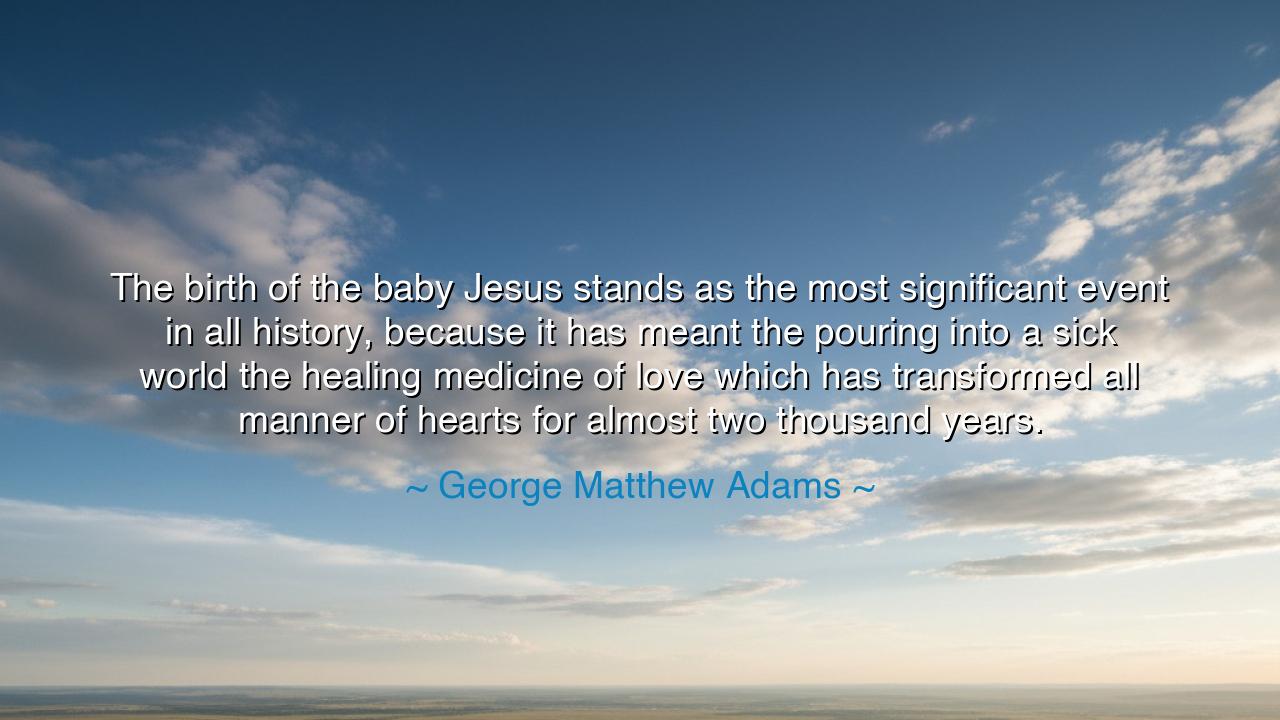
The birth of the baby Jesus stands as the most significant event
The birth of the baby Jesus stands as the most significant event in all history, because it has meant the pouring into a sick world the healing medicine of love which has transformed all manner of hearts for almost two thousand years.






In the words of George Matthew Adams, the poet of hope and herald of faith, there shines a truth older than empires and deeper than time itself: “The birth of the baby Jesus stands as the most significant event in all history, because it has meant the pouring into a sick world the healing medicine of love which has transformed all manner of hearts for almost two thousand years.” These words do not merely tell of religion — they speak of rebirth, of healing, and of the eternal struggle between despair and light. Adams looks not to kings or conquerors for the turning point of history, but to a child, born in poverty, whose power was not in the sword, but in love.
The origin of this truth lies in the humble night of Bethlehem, when, beneath a silent sky, the Infinite entered the finite. The world, as Adams calls it, was “sick” — weary from cruelty, division, and oppression. Empires ruled by fear, and hearts grew cold beneath the weight of pride. Into this darkness came the light of Christ’s birth, not as a thunderclap but as a whisper. The baby Jesus — fragile, helpless, yet divine — became the greatest paradox of all creation: the Almighty swaddled in humility. From that moment, love ceased to be an ideal and became a living force, a medicine poured into the wounds of the human soul.
The ancient world before His coming had known power, wisdom, and glory, but not grace. The Greeks taught philosophy, but not forgiveness. The Romans built law, but not mercy. It was in this age of iron and ambition that love appeared — not as sentiment, but as salvation. The child who would one day speak the words “Love your enemies” offered the world a cure that neither armies nor empires could devise. It was love — selfless, enduring, healing — that turned the course of human history. Adams, centuries later, saw the proof of it not in theology alone, but in the transformation of hearts across time.
Consider the story of Francis of Assisi, the son of wealth who abandoned luxury to live among the poor. It was the spirit of Christ’s love that compelled him — not duty, not fear, but the medicine that Adams describes. Francis tended to the lepers, embraced the outcast, and sang hymns of joy even in suffering. Through him, and countless others like him — from Mother Teresa among the dying in Calcutta to Martin Luther King Jr. preaching peace amid hatred — we see that the power of Christ’s birth did not end in Bethlehem. It continues wherever love confronts despair, wherever compassion overcomes cruelty.
When Adams speaks of the “healing medicine of love,” he reminds us






AAdministratorAdministrator
Welcome, honored guests. Please leave a comment, we will respond soon